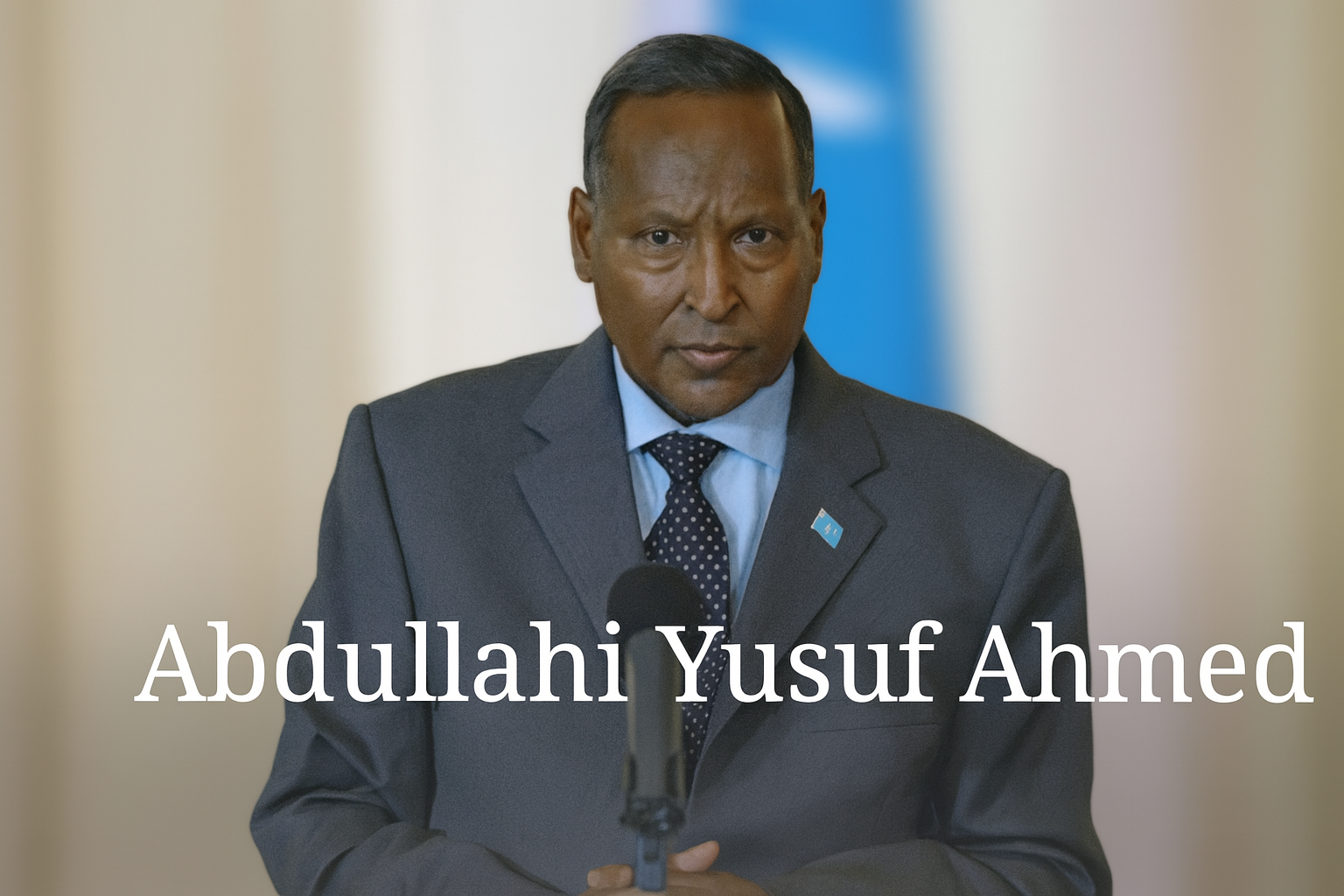Abdullahi Yusuf Ahmed: Somalia’s Warrior President and the Architect of Puntland
From military rebellion to national leadership—tracing the bold legacy of Somalia’s transitional leader

Abdullahi Yusuf Ahmed was born on 15 December 1934 in Galkayo, a town located in the Mudug region of what was then Italian Somaliland. Raised in a traditional Somali setting, Yusuf hailed from the Majeerteen sub-clan of the Darod family, a lineage influential in Somali politics and society. His early life was shaped by nomadic traditions and colonial rule, which later influenced his perspective on national identity and governance.
He began his professional journey in the police service during the Italian trusteeship before transitioning into the Somali National Army. He pursued higher education at the Somali National University and was later selected for military training in Italy and the prestigious Frunze Military Academy in the Soviet Union. This mix of legal and military education became the foundation of his leadership philosophy.
Quick Bio
| Attribute | Details |
|---|---|
| Full Name | Abdullahi Yusuf Ahmed |
| Date of Birth | 15 December 1934 |
| Place of Birth | Galkayo, Mudug region, Somalia |
| Nationality | Somali |
| Education | Somali National University, Frunze Academy, Italy |
| Occupation | Military Officer, Politician |
| Known For | Founding Puntland, President of Somalia |
| Spouse | Hawa Abdi Samatar (Death 11 May. 2022) |
| Children | Four (2 sons, 2 daughters) |
| Date of Death | 23 March 2012, UAE |
Military Career and Opposition to Siad Barre
Rise through the Somali National Army
Abdullahi Yusuf served with distinction in the Somali National Army. He fought in both the 1964 border war with Ethiopia and the 1977–78 Ogaden War, eventually attaining the rank of colonel. He earned a reputation for tactical skill and discipline, becoming one of Somalia’s most capable military officers.
Rebellion and Exile
Yusuf’s military career took a dramatic turn after the 1969 coup by Siad Barre. Refusing to support the authoritarian regime, he was imprisoned for six years. Upon his release, he returned to the battlefield during the Ogaden conflict but soon participated in a failed 1978 coup attempt against Barre. Following the failed rebellion, he fled to Ethiopia, where he founded the Somali Salvation Democratic Front (SSDF), the first organized opposition to Barre’s rule.
Founding President of Puntland (1998–2004)
The Birth of Puntland
After the collapse of Barre’s government in 1991, Somalia fragmented into competing warlord territories. Amid this chaos, Abdullahi Yusuf returned to the northeast and helped establish Puntland as an autonomous region in 1998. He was elected the first president of Puntland, bringing relative stability and a functioning administration to the region.
Political Crisis and Recovery
Yusuf’s tenure faced challenges, particularly during the 2001–2003 Puntland crisis, when he attempted to extend his term. Rival Jama Ali Jama claimed the presidency, leading to internal conflict. With military strength and political backing—especially from Ethiopia—Yusuf reasserted his authority and remained in power until 2004.
President of Somalia’s Transitional Federal Government (2004–2008)
Election and International Backing
In 2004, Abdullahi Yusuf was elected president of Somalia’s Transitional Federal Government (TFG), established to restore national unity. His election was backed by the international community, and he agreed to drop Somalia’s historical claims to Ethiopia’s Ogaden region in return for their support.
Military Campaigns and Internal Struggles
Yusuf’s government, backed by Ethiopian troops, defeated the Islamic Courts Union (ICU) in 2006 and regained control of Mogadishu. However, his administration was marked by internal divisions, disputes with parliament, and widespread corruption. In December 2008, under mounting pressure, he resigned and left Somalia for Yemen.
Personal Life and Family
Abdullahi Yusuf was married to Hawa Abdi Samatar, who served as Somalia’s First Lady from 2004 to 2008. The couple had four children—two sons and two daughters—and were grandparents to six. Hawa Abdi passed away in 2022 in the United Arab Emirates. While Yusuf was a fierce military and political figure, he was also known for maintaining strong ties to his family and tribal elders throughout his life.
Death and Later Years
After resigning the presidency, Yusuf spent his remaining years in Yemen and later in the UAE. He suffered from liver disease and had undergone a transplant in London. On 23 March 2012, he passed away in a UAE hospital at the age of 77. His death marked the end of an era for Somalia, and his body was returned to Puntland, where he was buried with state honors.
Legacy and Historical Significance
Abdullahi Yusuf Ahmed remains one of the most influential figures in modern Somali history. As the founder of Puntland, he introduced a model of regional stability that persists today. His leadership of the TFG laid the groundwork for Somalia’s slow return to centralized governance.
However, his legacy is not without controversy. Critics argue that his heavy-handed tactics and reliance on Ethiopian intervention undermined Somali sovereignty. Nevertheless, even detractors acknowledge his determination, discipline, and pivotal role in shaping Somalia’s political landscape.
Conclusion
Abdullahi Yusuf Ahmed’s life reflects the complex journey of a nation torn between war, hope, and reconstruction. From his early years as a soldier to his leadership in founding Puntland and guiding Somalia’s transitional government, Yusuf’s legacy is marked by resilience, strategic vision, and uncompromising conviction. While his methods were often seen as forceful and controversial, his influence on Somalia’s political framework and his commitment to restoring national governance remain undeniable. As a figure who shaped the path of modern Somali history, Abdullahi Yusuf leaves behind a legacy that continues to inspire both reflection and debate.
Frequently Asked Questions (FAQ)
Who was Abdullahi Yusuf Ahmed?
He was a Somali military officer and politician who served as the first president of Puntland and later as the president of Somalia’s Transitional Federal Government from 2004 to 2008.
What is Abdullahi Yusuf Ahmed known for?
He is best known for founding Puntland, opposing Siad Barre’s regime, and leading Somalia’s internationally recognized transitional government.
Who was his wife?
His wife was Hawa Abdi Samatar, Somalia’s former First Lady, who died in 2022.
Did he have children?
Yes, he had four children—two sons and two daughters—and six grandchildren.
What is his legacy?
He is remembered as a key figure in Somalia’s state-building efforts, though his leadership was both admired and criticized for its authoritarian style.



